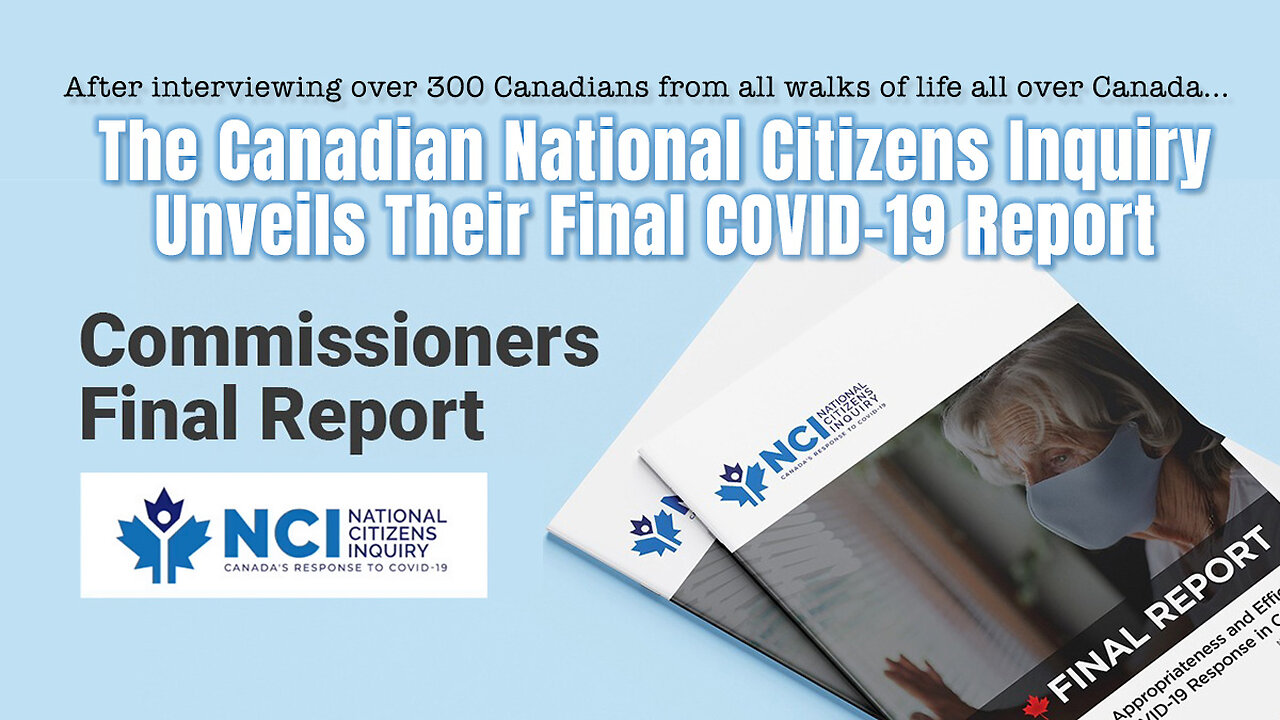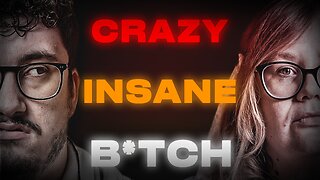Premium Only Content

The Canadian National Citizens Inquiry Unveils Their Final COVID-19 Report
National Citizens Inquiry Issues Commissioners’ Final Report
November 28, 2023
https://nationalcitizensinquiry.ca/national-citizens-inquiry-issues-commissioners-final-report/
Ottawa: The Final Report of the four independent Commissioners of the National Citizens Inquiry into Canada’s response to COVID-19 contains hundreds of recommendations impacting all segments of Canadian society. The Report was released during a virtual Hearing today.
The Commissioners’ Report is based on the testimony of more than 300 members of the public and expert witnesses during 24 days of hearings in eight cities and additional virtual hearings. Commissioner Chairperson, Ken Drysdale, speaking on behalf of the Commissioners, expressed deep appreciation for the individuals and organizations who courageously came forward to share their experiences, expertise and perspectives.
The independent, citizen-led, citizen-funded Inquiry was deliberately structured to be impartial, non- biased, free from political influence, with no funding from government and no large corporate funding.
The report laments that although subpoenas were issued to 63 members of government, regulators and authorities urging them to testify, none appeared.
The Commissioners Report describes profound damage done to the fabric of Canadian society and the nation. It documents heartbreaking and deeply shocking testimony from people who experienced adverse vaccine reactions, disruption of livelihoods and education, impaired mental health, reputational damage, professional discipline and censorship. Expert witnesses included doctors, scientists, lawyers, economists, teachers, psychologists, morticians, experts in risk management, public policy, emergency management, occupational health and safety, aviation safety, pharmacy, policing, and journalism.
In his remarks during the Hearing, Commissioner Drysdale described how the widespread acceptance of stringent government lockdowns, which would have previously been deemed inconceivable, represents a remarkable shift within a mere three years. He added, “These testimonies provide irrefutable evidence that an unprecedented assault has been waged against the citizens of Canada. Not since World War II has the nation experienced such a devastating attack on its people.”
Commissioner Drysdale asserted that, “The policy, legal, and health authority interventions into the lives of Canadians, our families, businesses, and communities were, and to a great extent remain, significant. In particular, these interventions have impacted the physical and mental health, civil liberties and fundamental freedoms, jobs and livelihoods, and overall social and economic well-being of nearly all Canadians.”
Drysdale continued, “Special attention must be paid to the sinister role that the public and private broadcasters played in terrorizing the public and then merely acting as mouthpieces of the government who relentlessly pounded Canadians with 24/7 propaganda without questions. We have prepared specific recommendations concerning these institutions. But the wholesale abandonment of long held fundamental beliefs and even codified law was not the sole purview of the media. Many public and private bodies such as schools, medical providers and regulators, unions, justice and policing all failed Canadians. These institutions and individuals must also be held to account.”
These are among the important Commissioners recommendations to address harms done and assist with future pandemic responses:
• The current use of COVID-19 genetic vaccines in Canada that were authorized under the revised provisions of the Interim Order and the newly revised Food and Drug Regulations, should be stopped immediately.
• A full judicial investigation of the process under which the COVID-19 vaccinations were authorized in Canada must be carried out. Criminal liability, if discovered, may be dealt with under existing Canadian law.
• Conduct a thorough review of the Canadian courts’ handling of pandemic-related cases and their impact on the rule of law. Rebuild public confidence in the justice system by addressing concerns raised during the pandemic.
• Examine and reform the extent of executive authority during emergencies, ensuring proper checks and balances to prevent unelected officials from making far-reaching decisions without accountability or oversight.
• Establish a clear framework for the oversight of public health authorities’ decision-making processes during emergencies to balance public health needs with individual rights and freedoms.
• Enact legislation that requires administrative bodies to demonstrate their expertise and rationale for decisions, particularly when those decisions infringe on individual and human rights.
• Establish a clear framework for the oversight of public health authorities’ decision-making processes during emergencies to balance public health needs with individual rights and freedoms.
• Conduct an independent, multidisciplinary inquiry into the governance of professional colleges, especially those governing medical professionals, to ensure transparency, independence, and accountability in their decision-making, and that activities of the colleges adhere to Canada’s Charter of Rights and Freedoms.
• Safeguard healthcare professionals’ freedom of expression while ensuring that they provide accurate and evidence-based information to the public.
• Review the ability of regulators to interfere in the patient–practitioner relationship, ensuring that professional judgment remains independent and guided by the best interests of the patient, including privacy protection of patient medical information.
• The government should review labour laws to ensure that they provide adequate protection to both unionized and non-unionized employees during health emergencies like the pandemic. This should include mechanisms for addressing workplace issues related to mandates and safety concerns.
• Ensure that in-person learning remains the primary mode of education, even during public health crises. Remote learning should only be used as a last resort and for a limited duration, and in conjunction with parental consultation.
• Develop strategies to support vulnerable populations, such as the homeless, those struggling with addiction, and victims of domestic abuse, during crises. Ensure that access to essential services is maintained.
• Canada should reinforce the importance of Informed Consent, especially in the context of medical treatments like vaccines. It should ensure that individuals have access to comprehensive information about medical treatments, including potential risks and benefits, and have the right to refuse treatment without coercion.
• Immediate development of a Judicial Panel, overseen by citizens, with the responsibility to investigate the human rights violations that were committed by both government and private corporations during the pandemic.
• Carry out immediate judicial reviews of all pandemic-related court cases that were denied on the basis of mootness or judicial notice.
• All levels of government must recognize that all religions including the body of Christ church is paramount in a free and democratic society and must be afforded all protections and shields guaranteed under the Criminal Code, the Canada Constitution, 1867, the Bill of Rights, and the Charter of Rights and Freedoms.
• Commission a study to determine the validity of setting up a National Crisis Oversight Council to safeguard democratic principles, protect individual rights and maintain public trust during future emergencies, such as pandemics.
• The NCI recommends that Canada register immediate reservation against the Pandemic Convention and the amendments to the International Health Regulations once they are put forth by the WHO to allow time for proper consideration of the initiatives and their potential impact on Canada. At the same time, Canada should conduct a public inquiry and consultation into the benefits and risks of both its current obligations under the WHO, and the proposed Pandemic Convention and proposed amendments to the International Health Regulations.
Digital copies of the Report are available at:
https://nationalcitizensinquiry.ca/
The Commissioners are:
• Chairperson Kenneth R. Drysdale, FEC, P.Eng., an executive engineer
• Heather DiGregorio, a senior partner in a law firm
• Janice Kaikkonen, MA, an educator and elected school board trustee
• Bernard Massie, PhD, an independent consultant in biotechnology
Additional information about the Commissioners is available at:
https://nationalcitizensinquiry.ca/meet-the-commissioners/
Media inquiries concerning the National Citizens Inquiry should be directed to:
press@nationalcitizensinquiry.ca
See also:
National Citizen's Inquiry on Rumble:
https://rumble.com/user/NationalCitizensInquiryCA
National Citizens Inquiry videos on this channel:
https://rumble.com/search/all?q=sunfellow%20-%20National%20Citizens
....................
-
 5:05
5:05
Sunfellow On COVID-19
10 days agoDr. Peter McCullough: How To Test For & Remove Dangerous Spike Proteins From Your Body!
4.46K8 -
 LIVE
LIVE
LFA TV
13 hours agoLFA TV ALL DAY STREAM - MONDAY 9/8/25
4,688 watching -
 1:49:43
1:49:43
Dear America
3 hours agoRepeat Offender Kills a Woman on a train!! WHY IS MSM SILENT!? + Are We Attacking Cartels??
69.2K67 -
 LIVE
LIVE
Viss
1 hour ago🔴LIVE - How To Win! - PUBG 101
94 watching -
 LIVE
LIVE
Caleb Hammer
12 hours agoMost Batsh*t Insane Woman I’ve Ever Met | Financial Audit
133 watching -
 LIVE
LIVE
Badlands Media
9 hours agoBadlands Daily: Sept. 8, 2025
4,199 watching -
 LIVE
LIVE
Total Horse Channel
14 hours ago2025 Reno Snaffle Bit Futurity | Monday
30 watching -
 2:16:08
2:16:08
Matt Kohrs
14 hours agoNew Highs Incoming?! 🚨🚨🚨 Live Trading Futures & Options
24.2K1 -
 LIVE
LIVE
Wendy Bell Radio
6 hours agoALL THE NEWS THAT'S FIT TO IGNORE
7,158 watching -
 43:26
43:26
MTNTOUGH Podcast w/ Dustin Diefenderfer
9 hours agoRiley Gaines: NCAA Champion's Bold Fight for Fairness and Faith | MTNPOD #132
4.87K4